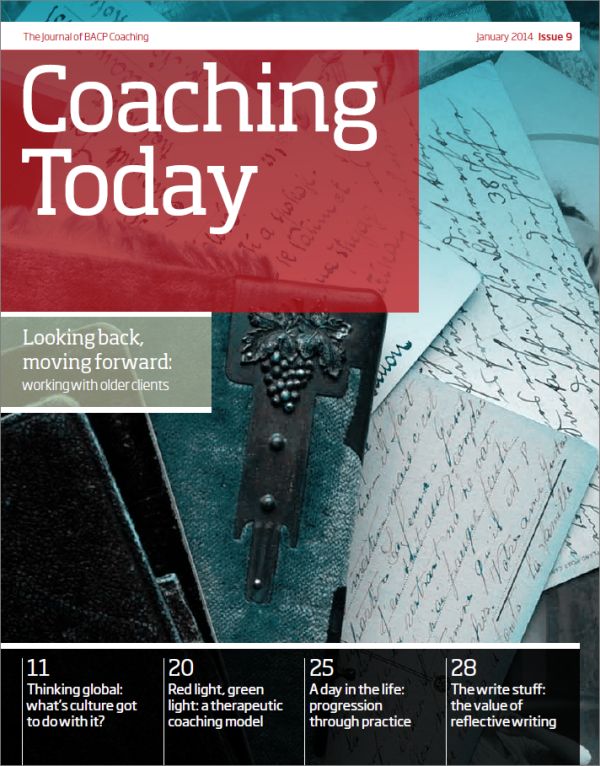In this issue
Features
A mature approach: meeting the needs of the over 50s through integrated practice
Keren Smedley
Thinking global: Culture as a positive resource in coaching
George MacDonald
STOPGO: a new paradigm of therapeutic coaching
Frances Masters
The write stuff: creative writing for coaches
Jackee Holder
Regulars
Message from the chair
In focus
Executive Specialist for Research Graham Wilson
A day in the life
Therapist, coach and Pesso Boyden System Psychomotor practitioner Sally Potter

Articles from this issue are not yet available online. Divisional members and subscribers can download the pdf from the Coaching Today archive.
Editorial
One of the key areas of debate that often arises for integrated coach-counselling practitioners is around the ‘appropriateness’ of our interventions. When should I be coaching? When should my approach be more therapeutic? And in what circumstances is it appropriate for me to make the shift from one to the other? Should there be a clear transition from counselling to coaching or are we able to ‘dance’ with our clients between the two (and yes, speaking as both a dance movement therapist and coaching practitioner, my pun was intended)?
Two features in this edition explore this very territory. Frances Masters introduces her own STOPGO model of integrated practice. The STOP phase is applied when clients need help in bringing to awareness subconscious beliefs, thought patterns and behaviours and interrupting them (STOP); the GO phase is activated when the client shifts from resolving pathology to a more goal-oriented, future focus (GO). And in our cover feature Keren Smedley author of Live the Life You Love at 50+, shows how her integrated approach can be applied to a very specific population – people aged over 50 – and why this approach is so essential when working with this particular age group.
Both emphasise the importance of transparency with the client, and of knowing intuitively when to work therapeutically, when to shift to a more outcome-focused coaching approach – in Frances Masters’ words, ‘pulling weeds’ or ‘sowing seeds’ – and how to move seamlessly between the two, sometimes within the same session. Through fascinating case studies they each demonstrate how it is in the moment of connection with the client that we enter the ‘dance’ – from looking back,
digging deep and reflecting on the past to facing forward, embracing the future and committing to clear action.
This thematic shift from past to future and from reflection to action has an extra poignancy in this, our second anniversary edition, and our Chair Jo Birch’s announcement that she is, after two years in the role, stepping down. As Jo explains in her Chair’s message, a new divisional Chair will be appointed from within the Executive and nominations are invited for a Chair Elect, details of which are also included in Jo’s message. Jo has been Chair of BACP Coaching for almost as long as this journal has been in print and it has been a pleasure to work alongside her. I’m sure you’ll join me in wishing her well and in thanking her for all her hard work. And I hope you’ll also look to the future with BACP Coaching and continue to contribute to the success of our division – and to the future of our profession.
Diane Parker
Editor
editorial@bacpcoaching.co.uk
